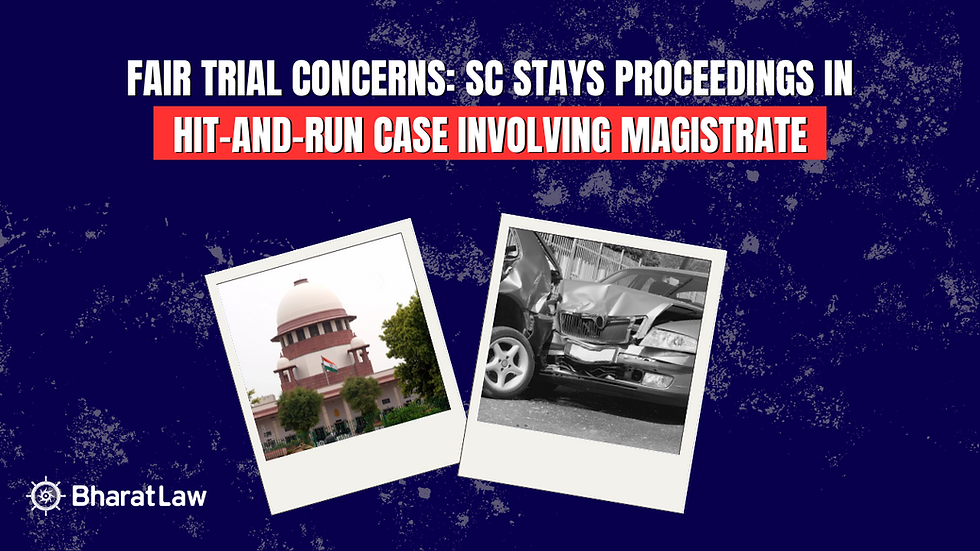Consistency and Fairness in Public Recruitment: Supreme Court Upholds Rule of Law in Kerala PSC Judgement
- Chintan Shah

- Nov 5, 2024
- 4 min read
Summary of the Judgment
Case Name: Anoop M. & Ors v. Gireeshkumar T.M. & Ors
Date of Judgement: 4th November 2024
Court: Supreme Court of India, Civil Appellate Jurisdiction
Judges: Hon’ble Justice Pamidighantam Sri Narasimha, Hon’ble Justice Sanjay Kumar
Acts and Sections:
Kerala Water Authority Service Rules, 2011
Kerala State and Subordinate Service Rules, 1958; Rule 10(a)(ii)
Cited Judgements:
Ajith K. & Ors v. Aneesh K.S. & Ors (2019) 17 SCC 147
Jyoti K.K. & Ors v. Kerala Public Service Commission (2010) 15 SCC 596
Sheo Shyam v. State of U.P. (2005) 10 SCC 314
State of Bihar v. Shyama Nandan Mishra 2022 SCC OnLine SC 554
Introduction
The recent Supreme Court judgement, delivered by Hon’ble Justices Pamidighantam Sri Narasimha and Sanjay Kumar, addresses a protracted recruitment dispute concerning the post of Lower Division Clerk (LDC) in the Kerala Water Authority. This case, originating from a 2012 notification by the Kerala Public Service Commission (KPSC), underscores the complexities surrounding qualifications for public service recruitment and sheds light on the legal principles governing statutory interpretation, equivalency in qualifications, and the responsibilities of public bodies.
Background of the Case
In 2012, the Kerala Public Service Commission issued a recruitment notice for LDC positions, specifying a basic educational qualification of a degree and a certificate in Data Entry and Office Automation. However, disputes arose when applicants with higher qualifications, specifically a Diploma in Computer Applications (DCA), sought eligibility despite the absence of explicit recognition for higher or equivalent qualifications in the KPSC’s notification.
The dispute led to a series of legal battles, beginning in the Kerala High Court, where some applicants challenged the exclusion of higher qualifications. The High Court initially favoured these applicants, directing the KPSC to revise its notification. However, the KPSC appealed, and a Division Bench of the Kerala High Court upheld the KPSC’s original stance. This ruling was later contested by applicants who argued that the KPSC had inconsistently included DCA holders in its shortlisted list, prompting the current appeal to the Supreme Court.
Key Legal Issues
The Supreme Court's deliberation centred on two key questions:
Does a higher qualification automatically presuppose the lower, specified qualification?
Is the KPSC bound by its initial recruitment norms and previous legal positions?
On both counts, the Court emphasized the importance of consistency in public decision-making, particularly for bodies like the KPSC, which bear the responsibility for transparent and fair recruitment processes.
"In a constitutional system rooted in the rule of law, the discretion available with public authorities is confined within clearly defined limits."
The Court's decision underscores the necessity for a consistent stance from public authorities, especially in contexts where fluctuating decisions affect the careers and aspirations of numerous candidates. Such a shift, the Court observed, could create unsavoury suspicions and undermine public trust.
Interpretation of the Kerala Water Authority Service Rules, 2011
In analysing the case, Hon’ble Justice Sanjay Kumar highlighted that the 2011 Rules explicitly require a Certificate in Data Entry and Office Automation for the LDC role. The equivalency, as stated, pertains solely to the institution from which the certificate is obtained, not the nature of the qualification itself.
The Court cited Rule 10(a)(ii) of the Kerala State and Subordinate Service Rules, 1958, which allows for equivalent qualifications only if specified in the recruitment norms or recognized through executive orders. Since the KPSC did not explicitly consider the DCA as equivalent, the Court ruled that the inclusion of DCA holders contradicted the notified qualifications and was, therefore, untenable.
"It is necessary for the KPSC to ascertain the experience level of higher qualifications before assuming they presuppose the knowledge acquired through the specified lower qualification."
Cited Precedents
The Court drew from precedents like Ajith K. v. Aneesh K.S. and Jyoti K.K. v. KPSC, distinguishing situations where higher qualifications might inherently cover lower ones. In contrast, the Court found that in this case, no evidence suggested that a diploma or degree in a computer-related subject would ensure expertise in data entry and office automation equivalent to the required certificate.
"Consistency in the stands of public bodies is crucial to avoid unwarranted implications on the lives of candidates awaiting public employment."
The judgement underscored the KPSC’s lack of due diligence in failing to evaluate the educational content of the DCA course against the skills imparted in the specified Data Entry and Office Automation certification.
Court’s Ruling and Implications
Hon’ble Justice Sanjay Kumar observed that the KPSC's vacillation throughout the litigation timeline led to this prolonged dispute, affecting the aspirations of countless candidates. The Court reproached the KPSC for inconsistent stances, which it deemed whimsical and contrary to the principles of administrative fairness.
Ultimately, the Supreme Court upheld the Kerala High Court’s decision, affirming that only candidates with the specified qualifications would be eligible for the LDC posts in the Kerala Water Authority. The judgement dismissed the KPSC’s appeals and mandated that the ranked list be amended to include only those meeting the original qualification criteria.
"A statutory body must uphold the highest standard of probity and transparency, refraining from arbitrary decisions that jeopardize public trust and credibility."
Conclusion
This judgement serves as a critical reminder to statutory bodies regarding the need for clarity, consistency, and transparency in recruitment processes. For legal professionals, the case highlights the judiciary's role in safeguarding procedural fairness and upholding principles of administrative law in public sector recruitment. Through this decision, the Supreme Court reiterates that qualification requirements, once set, cannot be altered arbitrarily without a rigorous, principle-based review. This precedent, thus, strengthens the accountability framework for recruitment in government services, promoting fairness and equitable access for all eligible candidates.



Comments